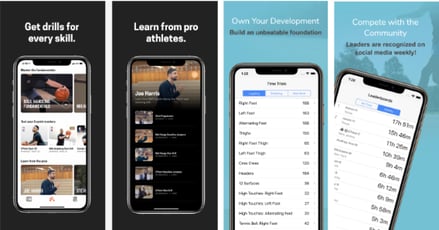nlopchantamang.com
Someone Please Entertain the Kids
Michael Waters
Source: Google Trends
The Signal: Kids are bored at home. Finding ways to keep them entertained is about to be big business.
US parents already spend $22B/yr on after-school activities like sports or dance classes, not to mention $36.2B/yr on child care. But as schools across the country have shuttered, kids are stuck in self-quarantine 24/7. Meanwhile, parents who are either trying to WFH or apply for new jobs are sleuthing out interactive ways to keep their kids active. The demand for virtual activities for kids isn't going to disappear once the virus does, however: Working from home may only become a bigger part of American life in the years ahead, and those companies that can ease the stress of child care now could earn long-lasting loyalties.
In the past 2 weeks, searches like "virtual kids activities" have spiked on Google Trends, alongside other queries like "homeschooling" or even "keeping kids busy." Sensing the demand, a cohort of companies from across several industries have pivoted to the online kids market.
- Instagram fitness stars like Joe Wicks are picking up 1 million+ viewers by streaming morning exercise routines for kids from their YouTube channels. (This probably breaks out to $3k to $5k per day.)
- Delish.com is hosting virtual cooking classes for parents and kids.
- RuPaul's Drag Race star Nina West is moving her drag queen story hour to Instagram Live after public libraries shut down. (West has 654k followers -- making her worth in the range of $10k per post.)
- In North Dakota, paleontologists are creating a daily program to teach kids marooned at home about dinosaur fossils.
- The San Diego Zoo, the Georgia Aquarium, and other parks and zoos are hosting virtual tours for kids who can't visit in person.
- Other parents are turning to free, ad-supported classes like Cosmic Yoga, Art Hub for Kids, and Go Noodle.
- Studio C, a dance studio in West Virginia, is rolling out a virtual dance camp every Friday at 6 pm to keep kids active during the coronavirus crisis. (One free stream is open to the public and helps drive membership to its $30/month membership; other, private streams take the place of regularly scheduled classes.)
The Opportunity:
Kids are facing weeks if not months at home, with public libraries closed and sporting events canceled. To stay sane, they need something to do. Even Quibi is going to get exhausting.
While many of the virtual kids’ programs mentioned above run on a freemium model -- with profits coming from a volatile ad market -- others are selling "seats" or "bunks" in virtual camps.
- Harley Yanoff, a Trends member and the founder of the NYC-based events and catering company Topnotch Events, is pivoting to virtual acting classes. Last week, he announced the rollout of a digital acting camp -- Broadway from Home. Within two hours, he sold out all 25 slots. ($35 for a single, 2-hour workshop; $95 for a 3-day package)
- In The City Camps, an Atlanta-based Jewish K-9 day camp, pioneered the virtual camp space in 2014 when a sudden snow flurry shut down the city of Atlanta. Now In The City Camps is back with virtual bunks, dedicated camp counselors, and a lineup of arts and crafts activities to get kids through the coronavirus -- and 75 families have already signed up.
- Shaan Puri, from our My First Million podcast, proposed the idea of the digital classroom that airs daily (think HQ Trivia, which just came back on air).
A few kids’ programs have also played around with a subscription model:
- MarcoPolo World School is an education app that teaches kids math and science through videos ($9.99/month)
- Brain Camps promises to bring K-12 kids tutorials in art, computer science, and zoology through the framework of a virtual treasure hunt. It's offering a Spring 2020 Quarantine Challenge pegged to school cancellations ($99 to $219/season)
- Connected Camps offers lessons in coding and engineering, taught with Minecraft as a classroom (price varies; usually $99.99/week)
- DingTalk brings homework grading and live-streaming features to self-quarantined teachers and students in China -- admittedly to the chagrin of the students themselves.
But the greatest interest appears to be in online lessons. With regularly scheduled music lessons, art and acting classes, and math workshops canceled, parents need replacements, fast. Searches for these terms have 10x’d in the past week, with all of them scoring 100 for peak popularity on Google Trends:
- "online music lessons" - 1.3k searches/month
- "virtual learning" - 3.6k searches/month
- "virtual classes" - 74k searches/month
- "online learning" - 27.1k searches/month
- "online math classes" - 1.9k searches/month
- "online design certificate" - 1.6k searches/month
- "online art classes" - 5.4k searches/month
- "remote learning" - 880 searches/month
California, New York, New Hampshire, Massachusetts, Michigan, and Ohio -- all of which have taken aggressive measures to close schools and stem the spread of COVID-19 -- represent a large bulk of the searches. But while New Hampshire, Ohio, and Michigan are rolling out online classes in public schools, those states that aren't -- like California and Massachusetts -- are especially primed to embrace startups offering remote lessons.
A savvy company that is able to partner with schools to offer class credit on virtual lessons might find success. Searches like "online design certificate" are on the rise, and in a state like Michigan -- whose online classes do not count for credit -- parents are looking for ways to get their kids academic credit.
Music lessons, for one, are already moving online -- and companies from Music Compound to Fender are preparing for a rush of sign-ups. Fender is even offering a 3-month free trial to the first 100k people who register. The online lesson space, they're betting, is about to balloon.

Leave a Comment